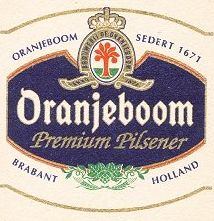Oranjeboom Brewery
 |
|
| Type | pilsner |
|---|---|
| Manufacturer | United Dutch Breweries BV |
| Country of origin | Netherlands |
| Introduced | 1671 |
| Alcohol by volume | Extra Strong 8.5% ABV Super Strong 12.0% ABV |
The Oranjeboom Brewery (Dutch pronunciation: [oːˈrɑɲəˌboːm]) was founded in Rotterdam in 1671. The brewery there closed in 1990, with production shifted to Breda. That brewery was sold to Interbrew in 1995 and was closed in 2004 by InBev, Interbrew's successor. Production of the brand Oranjeboom was moved to the Dommelsch brewery. In October 2013 Oranjeboom was relaunched as a "quirky" new European style lager.
The brewery dates from 1671, and started with the merger of two Rotterdam breweries, De Dissel and van den Oranjeboom; it was originally housed on the Coolvest, in the center of town.
Late 19th-century developments in the Dutch brewing industry all involved the then-new process of brewing lager, which used a yeast with the capability of cool fermenting; this allowed for production year-round, but required significant investments in modern technology and cold storage. In 1872 the brewery was owned by Willem Baartz, who was looking to get into the lager market. Baartz approached Gerard Adriaan Heineken but instead got involved in a new venture that led to the founding of Heineken's Bierbrouwerij Maatschappij. By 1882 Oranjeboom had been sold on to the (Protestant) brewing company De Gekroonde Valk, one of the first breweries in the Netherlands to brew lager. In 1885 a brand-new brewery was opened on Oranjeboomstraat in the Feijenoord district, then a new development south of the city. The city named the street for the brewery, which around the turn of the century was an important employer providing over 200 jobs, and one of the largest breweries in the country. After World War II, several other breweries were bought to meet demand and stay competitive: De Wereld (Raamsdonk, 1948), Wertha (Weert, 1960), Zuidhollandse Bierbrouwerij (The Hague, 1960), Phoenix (Amersfoort, 1961), and Barbarossa (Groningen, 1964). None of these breweries remain.
...
Wikipedia
